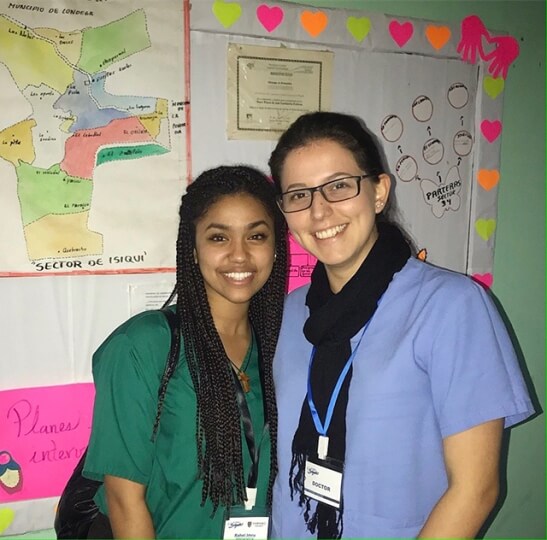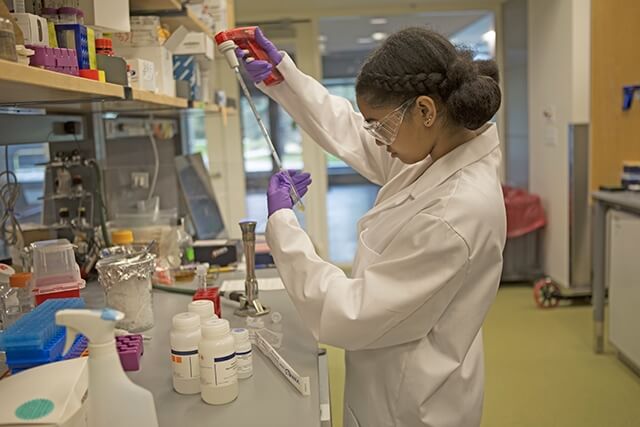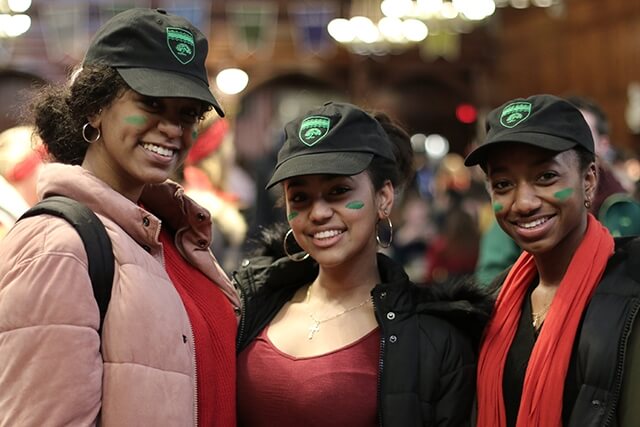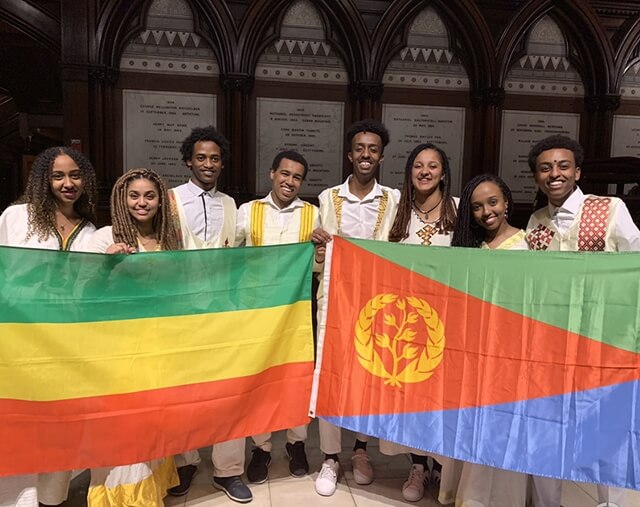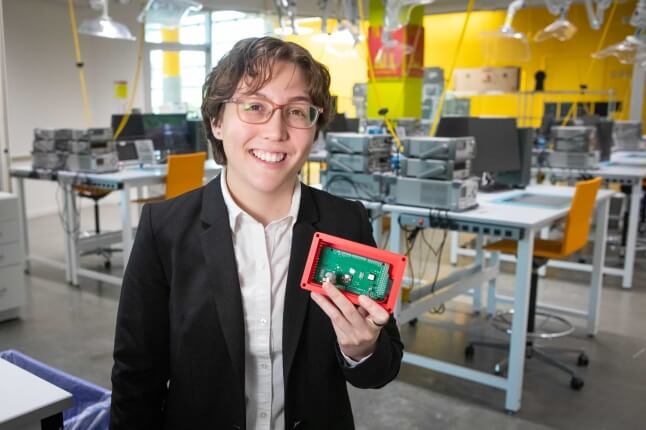News
Even as a child, Rahel Imru harbored a passion for science and felt a thrill of discovery when she conducted experiments. But by the time she was in high school, she began noticing that there weren’t many other Black students in her upper-level science classes.
So she set out to change that. Imru launched a junior chapter of the National Society of Black Engineers at her high school and led outreach events at the neighboring middle school. She and her fellow students set up eye-catching experiments and helped their younger peers with science projects.
During her experiences with the Harvard Global Medical Brigades in Nicaragua, Imru was inspired by way doctors and nurses selflessly cared for patients. (Photo courtesy of Rahel Imru)
“I just wanted to make sure that other students of color didn’t feel discouraged, because those feelings of imposter syndrome can really hinder a student’s aspirations, goals, and dreams,” she said. “It was really important to me that students didn’t feel out of place—because there are times that I feel that way in science—so I wanted to be a part of that effort to help other students.”
Imru carried that passion to Harvard. She chose to concentrate in biomedical engineering at the John A. Paulson School of Engineering and Applied Sciences, with a secondary in global health and health policy, so she could learn how to combine technology and medicine to aid underrepresented communities.
A volunteer experience with Harvard Global Medical Brigades opened her eyes to the prevalence of health disparities on a global scale. As a freshman, Imru traveled to Nicaragua to work alongside doctors and nurses who were setting up a temporary medical clinic to serve rural communities that lacked access to even the most basic health services.
Imru was inspired by the way doctors and nurses selflessly cared for patients, and began to consider a career in medicine. At the same time, she wanted to delve deeper into cutting-edge biomedical research, so she joined Harvard’s International Genetically Engineered Machine competition team. In what was her first experience in a research lab, she and her teammates worked to genetically engineer blood vessel receptors so they could signal conditions like blood clots, narrowing of the blood vessels, and atherosclerosis.
Imru works in the lab as a member of Harvard’s International Genetically Engineered Machine Competition team. (Photo by Adam Zewe/SEAS Communications)
The hands-on work was delicate and oftentimes frustrating, but proved to be a big confidence booster.
“I learned that all the failed experiments were just as important as the positive results,” she said. “It was a great learning experience and it definitely taught a lot of patience, resilience, and a lot of skills that are really helpful to any fields you get into.”
As she contemplated her own career aspirations, Imru began looking for ways to encourage and inspire other Black students in STEM through the Harvard Society of Black Scientists and Engineers. She had joined the organization during her freshman year and served as its president when she was a junior.
Imru led the HSBSE board as they worked to bring more recruiters to campus to help students of color find internships and job opportunities. They partnered with the Princeton Review to offer sessions that explained the structure of the MCAT and shared study strategies, and they were able to offer HSBSE members a discount on the test.
The group also launched a mentorship program with Boston Latin School; although it was put on hold due to the onset of the COVID-19 pandemic, Imru is excited for the future opportunity to inspire younger students to consider STEM.
Imru during Housing Day festivities in 2018, with a few of her Currier housemates. (Photo courtesy of Rahel Imru)
“I think it is really important that, from the start, Black students who come in interested in STEM don’t feel intimidated or out of place in their STEM classes,” Imru said. “It is important to show there is a strong, loving community for Black students interested in STEM at Harvard. Providing resources to those students is really important to help them feel welcome and supported enough to follow their scientific aspirations.”
It can be tough to balance the demands of intense engineering coursework without a supportive network of peers, she said.
Throughout her time at Harvard, Imru has helped balance her heavy load of STEM classes through dance, a pastime she’s enjoyed since childhood. She has danced with Expressions, Harvard’s hip hop dance company, and helped launch an Eritrean and Ethiopian dance group in 2019 for the student-led Cultural Rhythms festival.
Imru poses with the members of the Eritrean and Ethiopian dance team after their 2019 Cultural Rhythms performance. (Photo courtesy of Rahel Imru)
For Imru, whose parents immigrated to the U.S. from Ethiopia, it was rewarding to showcase her culture to the Harvard community.
“My culture is definitely a big part of my life,” she said. “The amount of sacrifice and hard work that it took for my parents to come from Ethiopia and build their lives here is very inspiring for me. Their stories were a lot of my motivation growing up, and pushed me to work hard in my academics.”
Imru’s next aspiration is to attend medical school to earn an MD and also a master’s of public health. As a physician, she hopes to influence public policy, and raise awareness of how structural racism and discrimination negatively impact human health.
Recalling a junior and senior year that were upended by COVID-19, Imru is grateful she had time to reflect, consider options, and find the most fulfilling post-graduation path. Despite the isolation she felt after leaving campus, there have been a few silver linings to the remote environment.
“A plus side, when thinking about disparities, all of the med school application process is online, including interviews, which would typically be in person. And I know that financial cost is a big barrier for a lot of students of color who want to apply to med school,” she said. “The virtual format is making things more accessible for some people.”
While she knows there is a long road and a lot of education still ahead, she’s looking forward to applying the skills she develops to make affordable health care more accessible to underserved communities around the world.
Topics: Undergraduate Student Profile
Cutting-edge science delivered direct to your inbox.
Join the Harvard SEAS mailing list.
Press Contact
Adam Zewe | 617-496-5878 | azewe@seas.harvard.edu
